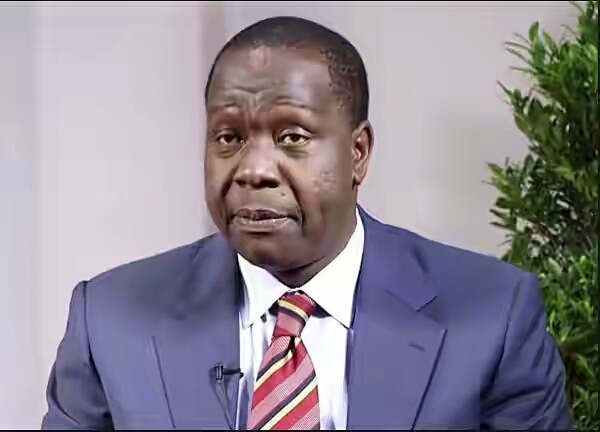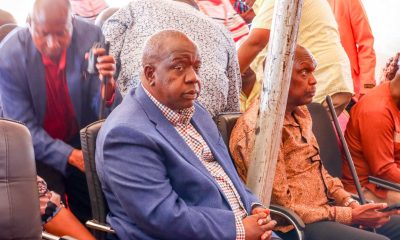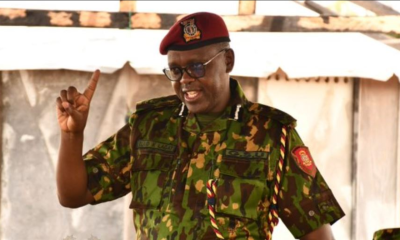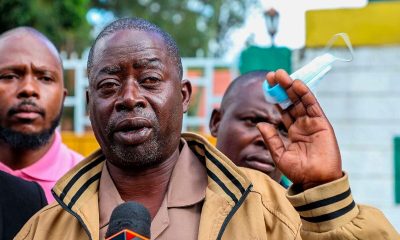Politics
Matiang’i’s Bluff Called Out As He Condemns Ojwang’s Death Amid His Past in River Yala Deaths

Former Interior CS’s condemnation of police brutality rings hollow as critics point to his tenure’s dark legacy
NAIROBI, Kenya – Former Interior Cabinet Secretary Fred Matiang’i’s condemnation of the death of teacher-blogger Albert Ojwang in police custody has sparked outrage and accusations of hypocrisy, with critics pointing to the grim legacy of extrajudicial killings that marked his tenure at the helm of Kenya’s security apparatus.
Matiang’i, who served as Interior CS from 2017 to 2022 under President Uhuru Kenyatta’s administration, described Ojwang’s killing as “cold-hearted” and a “heartbreaking reminder of the urgent need for reform in our criminal justice system.” However, his statement has been met with derision from Kenyans who remember the horror of the River Yala bodies scandal that occurred under his watch.
Albert Ojwang, a 31-year-old teacher and blogger, died while in police custody on June 8, 2025, after being arrested for allegedly posting critical comments about a senior police officer on social media platform X.
Police initially claimed Ojwang had died by suicide, with an officer finding him “with blood oozing from his head” during a routine cell visit.
However, an autopsy conducted revealed evidence suggesting he was strangled, contradicting police claims that he injured himself by banging his head against the wall.
The revelation has intensified public outcry and demands for accountability.
Inspector-General of Police Douglas Kanja has interdicted the Officer Commanding the Station (OCS) at Nairobi’s Central Police Station, as well as all officers involved in the case, as investigations continue.
Matiang’i’s Dark Legacy
The irony of Matiang’i’s condemnation has not been lost on Kenyans, who recall the disturbing discovery of bodies in River Yala during his tenure as Interior CS.
President William Ruto revealed in January 2023 that “Thirty bodies in Yala, 17 in Garissa…there was a container here at Nairobi Area where people were being slaughtered, in a police station” during Matiang’i’s watch.
The River Yala scandal broke in early 2022 when local divers began retrieving decomposed bodies from the river in Siaya County.
The macabre discovery eventually yielded over 30 bodies, with many showing signs of torture and execution-style killings.
Human rights organizations documented patterns suggesting systematic extrajudicial killings by security forces.
National Assembly Majority Leader Kimani Ichung’wah had called for individuals who were in charge of the security docket when the bodies were found in River Yala to be brought to account, specifically mentioning Matiang’i alongside former DCI boss George Kinoti.
Matiang’i’s current stance appears politically motivated, as he has declared his intention to run for president in the forthcoming elections.
His condemnation of Ojwang’s death can be seen as an attempt to distance himself from his controversial past and position himself as a defender of human rights.
In his statement on Ojwang’s death, Matiang’i said: “Taking a citizen’s life is not only unjust, it is a fundamental violation of human rights. Albert was a young man full of promise, a beacon of hope for his family and the pride of his parents.”
The former CS demanded accountability, stating: “We must raise our voices not just for Albert, but for every young life, especially among the Gen Z that has been lost to extrajudicial killings in recent times. Enough is enough.”
President Ruto, who fired DCI boss George Kinoti upon assuming office, had promised an end to extrajudicial killings.
In October 2022, he disbanded the DCI’s Special Service Unit (SSU) and vowed: “There will be no extrajudicial killings in Kenya under my administration.”
However, Ojwang’s death suggests that the culture of impunity within Kenya’s security forces remains deeply entrenched, raising questions about the effectiveness of Ruto’s reforms.
Social media has been awash with criticism of Matiang’i’s statement, with many Kenyans expressing disbelief at his apparent amnesia regarding his own role in Kenya’s recent history of police brutality.
“The audacity of Matiang’i to condemn extrajudicial killings when River Yala happened on his watch is breathtaking,” wrote one Twitter user.
Another commented: “This is the same man who oversaw the systematic execution of Kenyans. His crocodile tears for Ojwang fool no one.”
Ojwang’s death represents a continuation of Kenya’s troubling pattern of extrajudicial killings and enforced disappearances.
Human rights organization Kituo Cha Sheria has documented 1,201 killings and 272 disappearances since 2007, highlighting the persistent nature of the problem across different administrations.
The teacher’s death has particularly galvanized Kenya’s Gen Z population, who see it as emblematic of the state’s intolerance for dissent and criticism, especially on social media platforms.
As investigations into Ojwang’s death continue, civil society organizations and opposition leaders have demanded a thorough probe and prosecution of all those involved.
They have also called for systemic reforms to address the culture of impunity within Kenya’s security forces.
The family of blogger and teacher Albert Ojwang revealed police had assured them of his safety before his arrest, only to receive news of his death hours later, adding another layer of betrayal to the tragedy.
For Matiang’i, his attempt to position himself as a champion of human rights while ignoring his own record may prove to be a political miscalculation. As one commentator noted: “You cannot run from your shadow, and Matiang’i’s shadow is very dark indeed.”
Kenya Insights allows guest blogging, if you want to be published on Kenya’s most authoritative and accurate blog, have an expose, news TIPS, story angles, human interest stories, drop us an email on [email protected] or via Telegram
-

 News1 week ago
News1 week agoTHE FIRM IN THE DOCK: How Kaplan and Stratton Became the Most Scrutinised Law Firm in Kenya
-

 Investigations2 weeks ago
Investigations2 weeks agoMulti-Million Dollar Fraud: Three Kenyans Face US Extradition in Massive Cybercrime Conspiracy
-

 Economy2 weeks ago
Economy2 weeks agoIran Demands Arrest, Prosecution Of Kenya’s Cup of Joe Director Director Over Sh2.6 Billion Tea Fraud
-

 Africa2 weeks ago
Africa2 weeks agoFBI Investigates Congresswoman Ilhan Omar’s Husband’s Sh3.8 Billion Businesses in Kenya, Somalia and Dubai
-

 Business2 weeks ago
Business2 weeks agoA Farm in Kenya’s Rift Valley Ignites a National Reckoning With Israeli Investment
-

 Grapevine7 days ago
Grapevine7 days agoA UN Director Based in Nairobi Was Deep in an Intimate Friendship With Epstein — He Even Sent Her a Sex Toy
-

 News2 weeks ago
News2 weeks agoTragedy As City Hall Hands Corrupt Ghanaian Firm Multimillion Garbage Collection Tender
-

 Arts & Culture2 weeks ago
Arts & Culture2 weeks agoWhen Lent and Ramadan Meet: Christians and Muslims Start Their Fasting Season Together




























